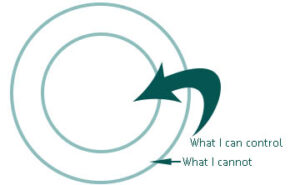
Although we cannot control all that happens in our life, we usually can control more than we realize. Our dreams, hopes, and desires are all in our control. While day-to-day we cannot control the temperature outside, we do control our level of comfort when venturing out, such as dressing in warm clothes on cold days and in flip flops on hot ones.
Encouraged to be modest from our earliest years, we sometimes need to learn, or relearn, how to appreciate our strengths and talents, and not minimize them. Major life changes often involve empowerment and a time to re-assess our strengths, abilities, and goals. By believing in what we can do, and by committing to that achievement, we can make it happen. Making conscious decisions about what we can control, in our home, at work, and with our children and relatives relieves anxiety and begins our journey to a happier future.
Sound abstract? Let’s make it more concrete.
Start by outlining your life in two concentric circles, drawing one inside the other. Then list what things you do have control over in the inner circle. In the outer circle, write down what you believe is not in your control. In our simple example, we could put weather in the outer circle, balanced by clothing in the inner circle.

Rather than tripping down the path of helplessness which may lead to unhappiness and passivity, demonstrate to yourself what you can do, and spend your energy on those activities. Don’t forget to list your virtues and strengths in the circle of the things you can control. Are you temperate? Persistent? Have humanity? Are you reaching for a greater purpose in life? Do you feel gratitude towards others? Are you forgiving? Generous? Friendly?
We also have control over our thoughts and reactions. If a family member is short-tempered, we cannot control their disposition. But we can control our interpretation of what is happening. Rather than immediately jumping to the conclusion they are disappointed or angry at something you did, consider an alternative, less self-critical possibilities. Could they be having problems with peers at school or be frustrated by a work-related problem? We can also control how we internalize that person’s frustrations by deciding that we’re not going to let them get us upset.
Martin Seligman’s landmark research on the pursuit of happiness teaches us that having a sense of control is important not only to us, but to animals as well. His research on “learned helplessness” in dogs demonstrated the power a sense of control has.
When faced with a problem we believe we cannot control, it can sometimes be easier to avoid the problem rather than trying to improve our situation. The process of divorce can be daunting and make you feel as if you’re not in control of the situation. Yet even when divorcing, you can assume some control over the process of establishing your new life. This can be done in many ways such as choosing attorney representation who understands your ultimate goals and represents you through the divorce process with those results in mind, or by choosing a skilled mediator who can help both parties reach an amicable divorce settlement. By being an active participant in the process, you as the client can – and will – gain some control when keeping your ultimate long-term goals in mind through your divorce process, and having your attorney and/or a neutral mediator assist with helping you achieve those goals. Once a settlement is reached, your resolutions can be incorporated into a Settlement Agreement.
Drawing concentric circles is a start to keeping focused on what you can do to control the outcome of your future. Talking with a counselor, objective friend, or trusted family member can help to continuously reinforce your confidence and awareness of your own power to build a positive future. Only you have control over your decisions to remain social, go out with friends, pursue activities and hobbies, and work towards your re-invigorated goals.
For more information, or to talk about a pending separation, divorce, or family issues with one of Jacobs Berger’s licensed and experienced New Jersey matrimonial law attorneys, contact us to schedule your strategy session with our team.






